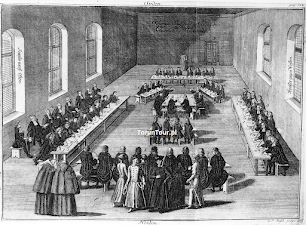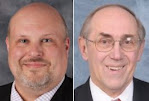[2025-05-24: see added note at bottom on Pres. Harrison on this; 2023-12-06: see this site for further helpful links on this subject.]
This concludes from Part 7 (Table of Contents in Part 1) in a series presenting an English translation of Walther's "Foreword" on Unionism to the 1871 volume of Lehre und Wehre. — To follow up on the Walther series against Unionism, there was a small blurb in Der Lutheraner on an event in 1908 regarding the practice of prayer fellowship. The occasion was the opening of a new General Synod (a forerunner of today's ELCA) church building in Baltimore where Methodist, Presbyterian and Episcopalian officials, even a Jewish Rabbi, were present. The officiator lamented that a Roman Catholic representative was not present, although a hymn of Cardinal Newman was sung. This event is a strong reminder of when, in 2001, LCMS Atlantic District President David Benke prayed among an even more eclectic group. — From Der Lutheraner, vol. 64 (1908), p. 111 [EN]:
- - - - - - - - - - - - - - - - - -
 |
| Colloquy of Thorn, 1645 |
- - - - - - - - - - - - - - - - - -
Who would deny that Poland is now a Catholic country? — I suspect LCMS scholars will label this report as "apocryphal" or spurious. But Calvinist Krasinski would have little motive to give a false report. — This DL report has been cited in recent years by Profs. Timothy Schmeling of the ELS and John Brug of Wisconsin Lutheran Seminary. Brug pointedly contrasts a writing of LCMS VP Scott Murray with the actions of the Lutheran fathers at the Thorn Colloquy in 1645. We quote:
“In a recent issue of LOGIA (Easter 2004 [13-2, p 8]) Scott Murray claimed, 'Our church fathers insisted on beginning with prayer when they participated in theological discussions with the Reformed and Roman Catholics in the seventeenth century. Only when the Catholics demanded to be the only ones to pray did the Lutheran party refuse to pray. More recently the so-called 10-10 meetings between ELCA and LCMS began with chapel in the respective national headquarters.' Does Calov’s report of the colloquy [of Thorn] permit such an interpretation? We will see that it does not.”
Brug also pointed out a similar falsehood that was stated by Dr. Samuel Nafzger:
“In an essay published in the Concordia Journal, July 2003, Samuel H. Nafzger, executive secretary of the Missouri Synod’s Commission on Theology and Church Relations, renewed the claim that the LCMS never held a unit concept of fellowship which included prayer on the same level as the means of grace as expressions of church fellowship, though he did grant that some in the LCMS may at times have had such a notion.”
Members of the LC-MS may think that their Synod is not unionistic with the ELCA and others, but their Lutheran fathers would say otherwise. The ELCA is not Lutheran in their teaching.
[2025-05-24: It has been pointed out elsewhere that Pres. Matthew Harrison also spoke like Dr. Scott Murray on an Issues, etc. program in 2015:
"I think, however, it’s always been recognized, and I think from the earliest times – and we disagree with the Wisconsin Synod on this – but it’s always been the case from the earliest times of the Lutheran Church that we, at the Colloquy of Thorn, for instance, and in other instances, Reformed, Catholic, and Lutherans came together and they held prayers before sessions, praying for unity. I think that is certainly not inappropriate."]
Harrison can "think" all he wants but he cannot truthfully claim that "it’s always been the case" that true Lutherans prayed with those who did not hold to the Biblical, Confessional, Lutheran faith.



.jpg)
No comments:
Post a Comment
Comments only accepted when directly related to the post.